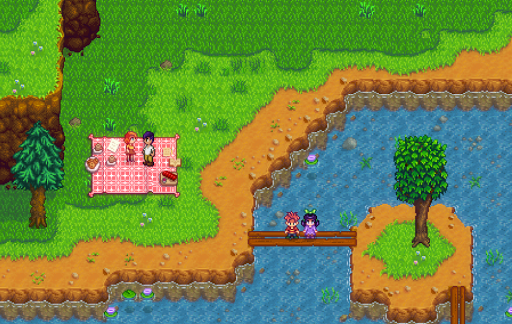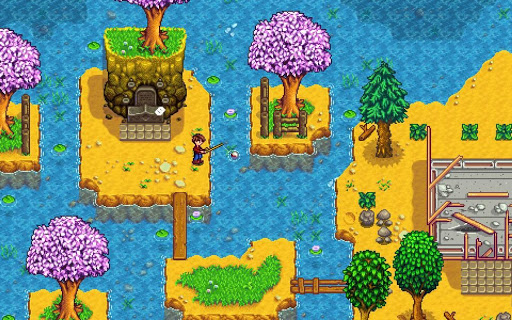Other game function in yet another way, offering us neither mometary distraction nor capitalistic replication but susteined escapism from our own reality. From famous examples such as The Walking Dead (Ps4, 2012) to Fallout (Ps3, 1997-present), the gaming industry is currently obsessed with apocalypse. Long a staple on TV and cinema screens, the zombie has now become even more prominent on PlayStation and PC.
Added to zombie games are reams of other dystopias, from indie game like Everybody’s gone to the Rapture (Ps4, 2015) and the cult classic Soma (Ps4, 2015), to big-budget productions like BioShock series (Ps3, 2007-present). As critics like Frederick Jameson, Slavoj Zizek and Mark Fisher have all variously pointed out, such images of dystopian futures promote the dangerous idea that only capitalism separates us from a barren wasteland. On the other side of gaming spectrum we are offered the opposite: a return to the pastoral past. A useful example in Stardew Valley (PC, 2016), an indie-produced farming simulator, or «country-life simulator», which overtook high-profile titles such as Grand Theft Auto 5 on its release. It might be easier to imagine the end of the world than the end of capitalism, but easier still, it seems, is imagining the resumption of pastoral serenity. At first glance, one might see Stardew Valley as a reincarnation of Zynga’s FarmVille, the Facebook sensation of 2010. That game offered the chance to nostalgically harvest crops from our computers, but as in other games made by Zynga, such as World with Friends and Mafia Wars, the real product being harvested is that of our facebook friends, whom we put to use to increase our in-game scores (and then turn to for approval for those scores). These so-called social games showed us a very dystopian present in which (as Heidegger suggested) people themselves are so much our raw materials as crops are. But Stardew Walley is more complex and has more in common with Harvest Moon (SNES, 1996). Like its forerunner Stardew Walley is individual, practically impossible to share or even discuss with friends, and has no multiplayer feature. Far from connecting us to social and technological media, it’s an offer to escape from the modern computer society –one we can indulge by sitting in front of our computer screen.
Though they seem to have little in common with gaming’s apocalyptic portraits of the future, Stardew Valley and other bucolic farming simulators actually provide a necessary counterpart. The gameplay in farming simulators involves organizing people, animals, and the natural environment, planting crops in systematic patterns and experiencing a routine life while playing a key role in small community. They picture of a lost era tightly knit villages where humans lived in organic harmony with nature complements prophesies of a dystopic future in which humans are regimented components of a remorseless capitalistic machine. Farming simulator placate a need for a collective and organized past as an alternative to contemporary chaos, showing the insular and protectivist edge in such experiences of gaming. This may make Stardew Valley seem like a criticism of modern capitalism, but in fact it does little to critique the supposed inevitability of capitalism. Instead it provides the missing piece in a linear account of human history that traces our decline from pastoral paradise to the sterile postcapitalistic desert. The best we can do –or so the game tell us– is take comfort in memories an in the fact that we are no further along the inescapable path of destruction. Such games take great pains not to offer an alternative to modern capitalism. As the game’s Joja Corporation –a blend of Walmart, Coca-Cola, and Google– starts its inevitable takeover of your peaceful village economy, Stardew Valley’s nationalistic indictment of internationalism becomes unmistakable. This is not a subversive critique of corporate globalization but a call for isolationist retreat. Stardew Valley’s image of small-scale self sufficiency draws from the same impulse to erect walls at borders and seek local salvation through exporting immiseration. Tellingly, the village in Stardew Valley has a bus stop but the bus has broken down, severing the connection between it and the rest of the world.
A real-life example of an alternative to this might be the Catalan communes developing in Spain today, which return to localized production but also use the internet and electronic current to trade across large distances. Such a hybrid of seizing the means of production whilst embracing global technology might assist us in the present crisis, but dreams of being cut off from the internet and the international community do nothing of the sort. Stardew Valley offers only the consolation of nostalgia, described by Svetlana Boym in The Future of Nostalgia as «the search for collective memory, a longing for continuity in a fragmented world»1S. Boym, The Future of Nostalgia, New York: Basic Books, 2002. In the past of Stardew Valley the gamer can escape to a world where they are “free” to be “human”. The game’s 16-bit pixelated graphics doubles up the nostalgia, evoking a lost age from the more recent past as well, when video games themselves weren’t as complicit and prefigurative of our coming doom –at least in people’s memory of them. It incorporates elements of Zelda, Pokémon, and other 1990s games that are evocative of a gentler past when games, it is assumed, were more “pure”, “organic”, and uncorrupted. It was a time when games really were seen as an escape from the political and social world –an argument that seems defunt today, when games seem to more overtly reflect or distill sociopolitical conflict.
(Extract from A. Bown, The Playstation Dreamworld, 2017, Polity, London)

